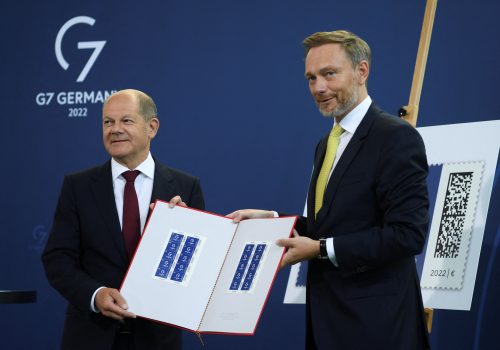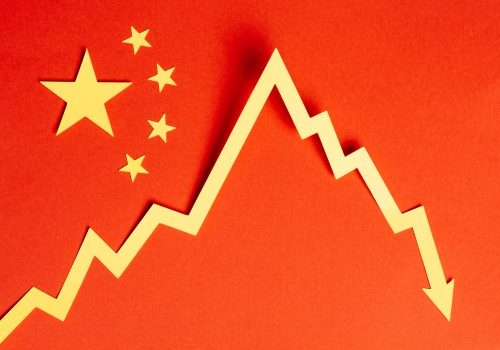Trouble for Emerging Markets could spell trouble for all
The global economy faces several headwinds; inflation and rising interest rates, volatile commodity prices made worse by Russia’s invasion of Ukraine, and ongoing disruptions from the COVID-19 pandemic. As these factors play out, emerging markets (EMs) are in a difficult position, especially after adding to their debt levels to combat the pandemic. Many are in financial distress, and some, such as Sri Lanka, are defaulting on their debt or near doing so. Advanced economies (AEs), the International Monetary Fund (IMF), and the World Bank should encourage EMs to address market volatility by using capital controls in some circumstances, develop more effective debt resolution programs, and provide funds. Decades of gains in EMs living standards, as well as economic stability globally, are at risk.
Around the world, governments used significant deficit spending to help their economies weather the COVID-19 storm. In EMs, the average public debt to GDP ratio just prior to the pandemic was 52 percent. In 2021 it increased to 67 percent, a historic high. This follows a decade long upward trend following the 2008 financial crisis. EM debt could more quickly spill over into domestic economic activity due to the large “sovereign-bank nexus” which characterizes many EMs. Their banks extended credit under government-backed stimuli. If EM governments face growing financial pressure and the public debt banks hold loses value, banks may be forced to freeze credit in dramatic fashion.
EMs currently face multiple pressure points. First among them the increase in global inflation, which caused central bankers in AEs to set higher interest rates. When AE central banks raise interest rates, EMs usually face capital outflows, higher borrowing costs, and currency fluctuations that impact their terms of trade. This time round, the JPMorgan EMBI Global Diversified EMs sovereign bonds index recently suffered its worst loss in nearly 30 years.
At the same time, Russia’s invasion of Ukraine has exacerbated pandemic supply chain disruptions and significantly increased commodity prices for EMs. EM food and energy prices, especially when imported, have skyrocketed. The rising prices for key inputs, higher borrowing costs, and continued fallout from the pandemic is leading to extremely difficult situations for EMs. Sri Lanka defaulted on its debt last month and more countries could easily follow suit. For example, Pakistan is currently negotiating with the IMF for assistance in managing its debt burden. A growing percentage of EMs are considered “distressed” — defined as potentially unable to fulfill financial obligations on present terms.
Economic and financial instability in EMs would have major negative impacts, none more so than for these countries’ people. Divergent pandemic recoveries mean that most EMs’ income growth was less than America the past few years, for the first time in nearly four decades. EMs are likely facing even worse conditions ahead; more poverty, greater food insecurity, and even slower growth that could lead to a “lost decade” of worsening living standards. According to the World Bank “the level of per capita income in developing economies this year will be nearly five percent below its pre-pandemic trend” and the forecast for the next several years has been revised down.
Aside from the moral necessity of addressing these issues, the entire global community has an economic interest in doing so. Financial and economic crises in EMs would create another meaningful headwind given financial and trade linkages. EMs (including China) represent around 45 percent of both global Foreign Direct Investment and trade, as well as about 35 to 45 percent of global GDP.
In addition, the opportunity cost of EMs forgoing climate spending, to instead service debt, is not a high-return proposition. EMs are projected to emit an increasing share of global emissions and are already struggling to make investments in sustainable development in wake of the pandemic. There is evidence that the latest debt developments are further limiting some EMs climate change investments. Notably, AEs have also not fulfilled their obligations in pledged climate finance assistance. Moving forward, AEs and multilateral institutions must help in multiple ways.
First, in certain situations, EMs should be encouraged to use capital controls — policy steps to curb the flow of foreign capital in and out of an economy. The international economics community has long frowned upon capital controls, believing they were inefficient. While free flowing global capital does have many economic benefits, research has shown the merit of smoothing out capital flow volatility depending on the country and macro environment. Capital controls can help prevent a surge of inflows from creating financial bubbles. They can also help manage “sudden stops” when foreign investors swiftly reverse course. For example, in the current context, temporary restrictions on capital outflows that are triggered based on preset crisis conditions could help prevent a downward financial system spiral and benefit most stakeholders. The IMF recently updated its Institutional View, although some suggest it should approve of capital controls even more broadly. Nonetheless, this evolution has come at the right time and should be a component of how some EMs manage the challenges ahead.
Second, mechanisms for debt restructuring must be enacted. At the onset of the pandemic official bilateral debt payments were frozen for certain countries, but they have since resumed. A new freeze for a broader set of countries should be instituted. The G20 framework for debt resolution also needs strengthening, most importantly by engaging private creditors and gaining clarity from Chinese State-Owned Enterprises on their lending terms extended to EMs.
Lastly, multilateral institutions should once again provide EMs in need with funding as they did earlier in the pandemic. Some have criticized the amount of support given to EMs during the pandemic as too little. To ensure effective support, member countries must leave no doubt and provide sufficient resources and leeway to help backstop a potentially large wave of distressed EMs.
One of the essential lessons of the COVID-19 pandemic is that countries are interconnected. EMs’ debt management is no different. Residents of EMs and other economies all over the world will be impacted by how this process plays out — now and later. Policymakers would do well to heed this important lesson and act boldly as they work with EMs to help maintain economic stability.
Jeff Goldstein is a contributor to the Atlantic Council’s GeoEconomics Center. During the Obama administration he served as the Deputy Chief of Staff and Special Assistant to the Chairman of the White House Council of Economic Advisers. He also worked at the Peterson Institute for International Economics. Views and opinions expressed are strictly his own.

At the intersection of economics, finance, and foreign policy, the GeoEconomics Center is a translation hub with the goal of helping shape a better global economic future.
Further reading
Image: Emerging Stock market data growth chart graph investment finance analysis fintech financial district


